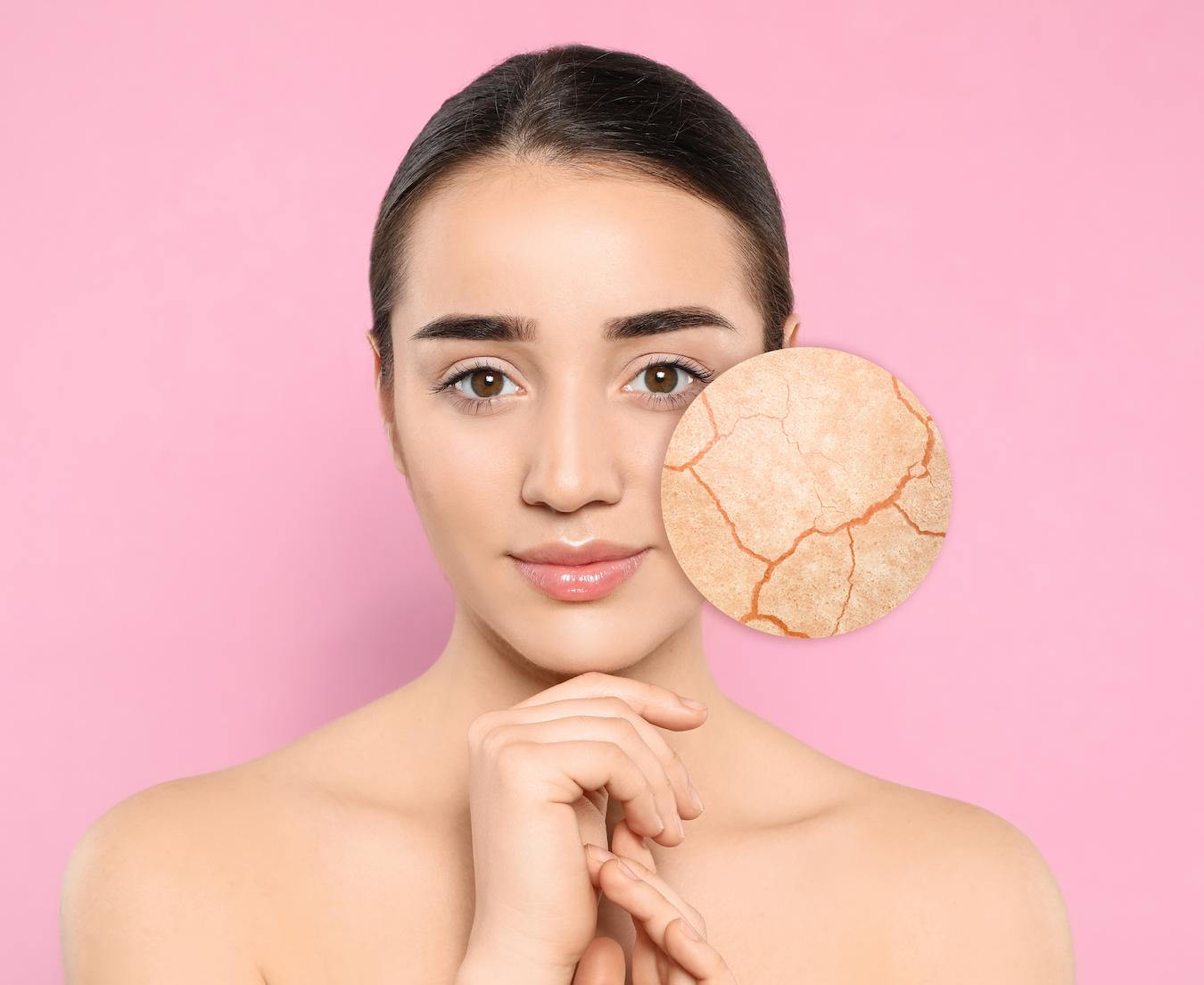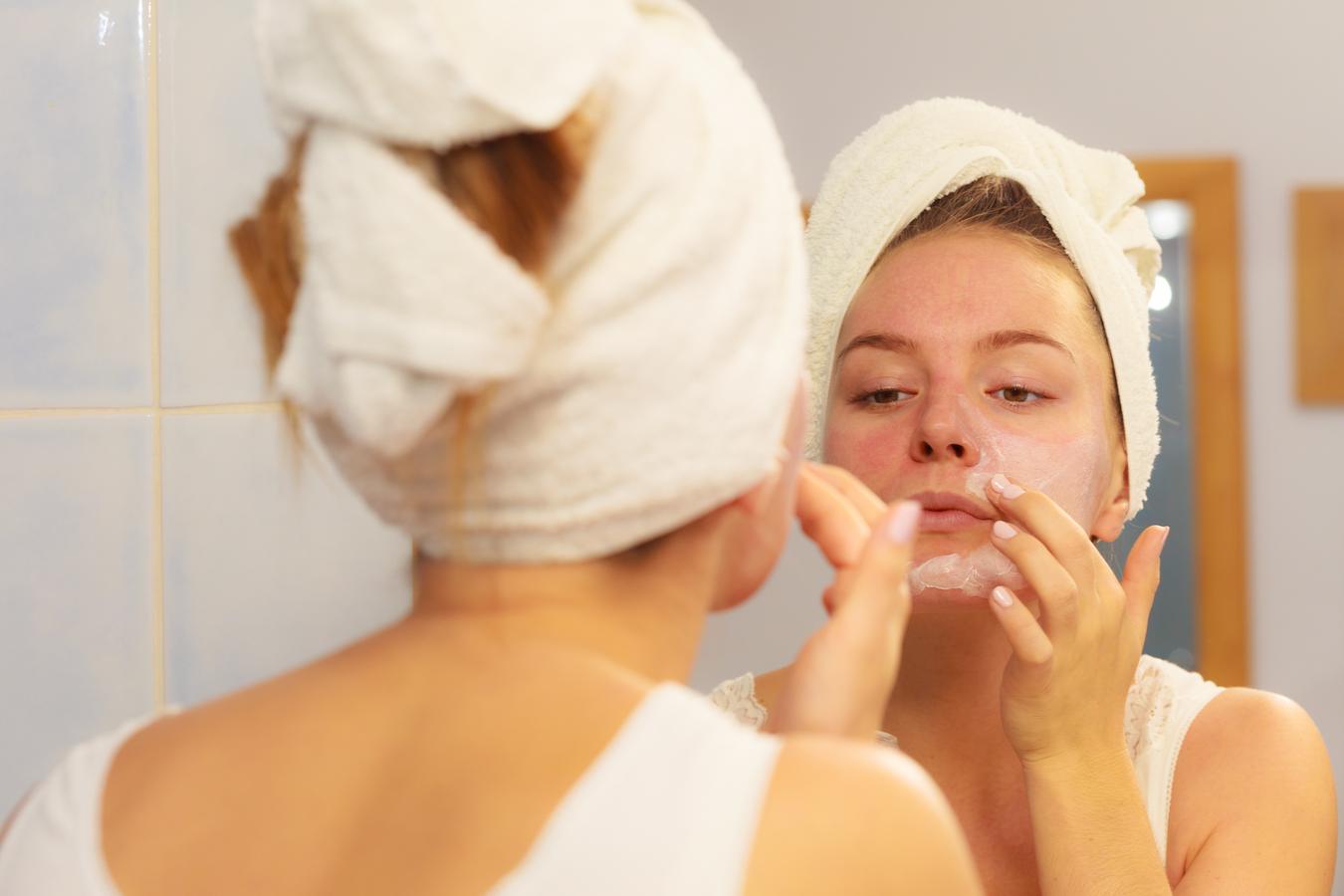6 Signs You Have Dehydrated Skin & Tips On How To Fix It

It is essential to keep your skin hydrated, no matter your skin type. If your skin is dehydrated, you will look red and splotchy. You could have dry patches that are cracked or flaky.
Key Takeaways
- Dehydrated skin may appear dry, tight, and full of fine lines
- Perform a simple pinch test on your skin to see if it is dehydrated
- Severe dehydration may require care from a dermatologist
- To combat dehydrated skin, cleanse your face twice daily
- Exfoliate once or twice a week
- Moisturize immediately after showing
- Apply sunscreen no matter what time of year it is
- Drink plenty of water throughout the day
- Use a humidifier in dry environments
To some people with normal skin, this can seem painful and uncomfortable. But to others, who suffer from even the mildest of allergy symptoms due to swelling and inflammation, the appearance of dehydrated skin can be the first sign of an allergic reaction that’s beginning to occur.
In this article, we will discuss a guide to what to look for and how to treat it.
Dehydrated skin results from a lack of moisture in the top layer of the epidermis (the outermost layer of the skin). This layer is called the stratum corneum, with dead cells constantly shed from below and replaced from above. When this process slows down due to dehydration, your skin becomes tighter and flaky as dead cells accumulate on its surface.
There are many causes for dry and dehydrated skin including aging, exposure to harsh weather conditions, certain beauty products, medical needs such as eczema and psoriasis, medications, and even stress! But regardless of its cause, dryness can appear anywhere on your body, especially in areas with frequent friction, such as elbows, knees, or hands.
See Related: What Is The Best Face Wash For Sensitive Skin?
Do You Have Dehydrated Skin?
One of the most common problems many people face with their skin is dehydration. The common telltale signs are: Noticeable fine lines, dry, and tight skin, sunken eyes, and skin that stays in place when lightly pinched is another signal.
We strongly recommend you seek the professional advice of a Board-Certified Dermatologist if you have any severe skin symptoms. However, there are some ways in which you can tell if your skin is suffering from dehydration.
Here are some ways how to know if your skin is dehydrated.
#1. You Have Tight and Itchy Skin
If your skin is dry and tight, it’s probably dehydrated. The best way to tell if this is happening is by gently pinching the skin on your arm.
If it doesn’t spring right back into place and feels tight rather than soft, it needs moisturizing immediately. You can also use a moisturizer with hyaluronic acid to help restore moisture deep down into the layers of skin cells.
#2. Dry Patches Are Visible
Dry patches on the skin surface are a common sign of dehydration in any season but especially in dry winter when heating systems turn on full blast in offices and homes everywhere! For these dry patches to go away for good, you need to exfoliate them off with a gentle scrub at least once per week — ideally more often if you can manage it.
#3. You Have a Weakened Skin Barrier
If your skin is dehydrated, it has less moisture, so its barrier is weakened and more susceptible to damage from irritants and toxins. This can cause breakouts (especially in the T-zone) and clogged pores.

Dehydrated skin also tends to be more sensitive to the sun. Sun exposure can worsen it by breaking down the lipids that help keep moisture in your skin.
#4. You’re Breaking Out Left and Right
This can be due to oily skin – which is also an indicator that the skin is dry. A lack of hydration makes it harder for skin cells to shed correctly — leaving dead cells on top of the surface of your skin instead of flaking off naturally. You might notice more blackheads around your nose or chin when you don’t drink enough water daily.
#5. Skin Problems, Like Eczema or Psoriasis, Flare Up
When your skin is dry, it becomes more susceptible to eczema and psoriasis flare-ups. This condition can be challenging to manage because it requires frequent moisturizing.
If you have eczema or psoriasis, your dermatologist may recommend using oil-based moisturizers with ceramides (fatty acids) to help reduce the symptoms’ severity.
#6. More Noticeable Fine Lines
When your skin isn’t getting enough moisture from the outside world, it starts to pull it from within. This causes fine lines and wrinkles to appear prematurely on your face.
Your body may also produce more oil to compensate for its lack of hydration — which can make acne worse or cause blackheads and whiteheads if you’re prone to breakouts.
Tips on How to Hydrate Your Skin
Healthy skin is hydrated skin. Yes, it is that simple.
We care for our hair, skin, and teeth to make them look good. In addition, we also take care of the nails. Keeping healthy and beautiful nails is the trend these days.

However, did you know that skin plays a vital role in looking beautiful? Most people do not realize that the skin is an organ like the lungs or liver and should be taken care of when hydrated.
Here are some tips on how to hydrate your skin.
Cleanse Your Face Twice a Day
When it comes to skincare, one of the most important tips is to cleanse your face twice a day. It’s also one of the easiest ways to keep your skin hydrated.
This will help eliminate any dirt or oil that may have accumulated throughout the day and allow for better absorption of any moisturizing products you use.
Exfoliate Once or Twice a Week
Exfoliating is another great way to keep your skin hydrated because it removes dead skin cells and lets moisture penetrate more easily into your pores. However, you should avoid using harsh exfoliants because they can damage your skin and make it more susceptible to infection.
A gentle scrub that contains natural ingredients like jojoba beads is ideal for normal-to-dry skin types or those who suffer from acne breakouts. Those with oily or dehydrated skin should use a scrub only once per week since overdoing it can lead to skin irritation or redness.
Moisturize Immediately After Showering
The first thing you should do when you get out of the shower is moisturized your skin. Your skin has been stripped of its natural oils and can become dry, increasing the risk of an acne breakout.
(P.S. Don’t bathe with hot water! It causes dry skin!)
Apply Sunscreen Regardless of Weather or Location.
Sun exposure is one of the most common causes of wrinkles, age spots, and other signs of premature aging in adults. Protect your skin by applying a broad-spectrum sunscreen with SPF 30 or higher before going outside in the sun.
Apply it every two hours if spending more than two hours outside, and reapply after swimming or sweating excessively (or once every couple of hours).
Drink Plenty Of Water Several Times A Day, Every Day.
Your body needs water to function correctly and stay healthy — even more so when it comes to your skin! Water helps flush toxins out of your body and helps keep your body functioning at its peak performance level, which means that it will be able to fight off any potential breakouts before they start to appear on your face!
Water also helps keep your skin looking fresh and dewy all day long.
Use Humidifiers in Dry Environments (Especially During Winter)
The air inside your home may be dryer than you think. Dry air can cause your skin to dry and crack, leaving it vulnerable to infections. To combat this, use a humidifier in your home during winter when heating systems are running more often.

This helps keep the air moist and adds moisture back into the air. If you don’t have a humidifier, try running hot water in a bathtub or shower for five minutes before getting in to help add moisture back into the air.
Bonus: What To Pair With Glycolic Acid
A Simple Dehydrated Skin Care Routine
Never paid much attention to the ratios in a skincare routine? It’s time you did. Just like an exquisitely balanced meal, a hydrating skincare routine is based around these ratios – oil, water, and acid (or, in this case, humectant).
Each ingredient plays a vital role in your skincare routine, and proper balancing allows you to reap the full benefits of your skincare products. The following is the routine.
Wash With A Water-Based Cleanser & Lukewarm Water
Maintaining a healthy skincare routine is essential for keeping your complexion in tip-top shape. But what exactly does this entail?
It all begins with cleansing. Cleansing your face thoroughly with gentle cleansers and lukewarm water can help remove dirt and oil that builds up throughout the day. This way, you’ll be able to start your routine with a clean slate, which will make it easier to treat any acne or dry patches you might have.
Moisturize with a Water-Based Moisturizer
After cleansing, you should moisturize your face with products designed specifically for this purpose. Moisturizers help restore hydration to the skin and prevent dehydration, which can lead to wrinkles and fine lines over time.
It’s also essential to use sunscreen daily if you live in an area where sun exposure is expected — even if it isn’t summertime yet.
Apply A Serum
To help your skin stay hydrated, start with a serum or essence. These lightweight formulas are formulated with hyaluronic acid to lock in moisture and boost hydration to dehydrated skin. In the morning and evening, apply an essence after cleansing and toning. You can use it as your moisturizer or on top of your regular moisturizer.
If you have dry skin, choose a formula that contains hyaluronic acid since this ingredient can attract water molecules from the air around us and pull them into our skin cells. It’s also considered an essential ingredient in beauty products because it helps our skin retain moisture for longer than other ingredients.
Protect Your Skin’s Outer Layer
The skin on your body is your largest organ and serves as a barrier against the outside world. But how do you protect your skin from the elements?
For starters, make sure you drink plenty of water. Water helps keep your skin hydrated, which will help prevent dryness and flaking. You should also avoid using harsh chemicals on your body—these can irritate or dry out the skin.
When it comes to skin care, it’s best to use products that are designed specifically for this purpose. You may be tempted to skip moisturizing at night because you don’t want to wake up with greasy skin, but this is a bad idea.
Not only does moisturizing help lock in moisture from the day before, but it also allows your skin to absorb other active ingredients in skincare products better than if you didn’t moisturize. The key is finding a moisturizer that won’t cause breakouts or irritation—there are some great options.
Use A Gentle Exfoliant
Another step in a dehydrated skincare routine is to use a gentle exfoliant. But if you want to add extra perks to your cleansing routine (like treating dry skin), you’ll want to add an exfoliant into the mix.

Exfoliants are great for removing dead skin cells from your face, which will help reduce oil production and improve the appearance of your complexion over time. They can also help prevent acne by keeping pores clear and clean!
You may have heard that too much exfoliation can harm your skin—but that’s not always true! It all depends on how often you’re using it and what type of exfoliant you’re using.
Use A Hyaluronic Acid Serum
Hyaluronic acid is a naturally occurring substance that occurs in the human body. It’s found in connective tissues, such as cartilage and skin, and helps retain moisture.
The hyaluronic acid serum is often used as part of a skincare routine because it can help keep your skin hydrated while you sleep or at work. There are several reasons why you might want to consider adding a hyaluronic acid serum to your skincare routine:
- It helps repair damaged tissue by increasing the production of collagen and elastin—two proteins that give structure to your skin.
- It helps improve the elasticity of your skin so that it holds onto its natural moisture better than before.
- It helps increase hydration levels within your body by binding with water molecules on the surface of your skin cells (known as cell membranes) so that they appear plump and full rather than sunken or wrinkled.
Wrapping Up
Dehydrated skin can result in dullness and wrinkles that are more prominent and deep. As we age, our skin loses its elasticity and water content, making skin thin and wrinkled.
Moisturizers that contain hyaluronic acid and glycerin help combat this. They provide the skin with the moisture it needs to produce a healthy glow and help hold onto moisture for optimal hydration.
Keep Reading: How To Fix Dehydrated Skin
—
For over 60 years, Viviane Woodard has represented “The Purity of Skincare”. We are the leading beauty brand for skin care products and promote the importance of good skin hydration. Follow us on Facebook, Instagram, Twitter, and Pinterest for skin care tips, product discounts, and more.
